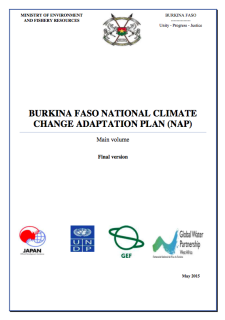The new vision Burkina Faso National Climate Change Adaptation Plan (NAP) adopted under the UNFCCC has the advantage of ensuring that better account is taken of climate change in development policies and strategies and of bringing backers on board who fund climate change adaptation. The objective of NAP is to reduce vulnerability to the impact of climate change by developing adaptation and resilience capabilities, facilitate the integration of climate change adaptation into new or existing policies, programmes or activities and in specific development planning processes and strategies in pertinent sectors and at various levels in a coherent manner.
The Burkina Faso NAP comprises adaptation plans for each development sector and a global adaptation plan for the entire country. It ultimately results in a reference document the contains practical information which will potentially help to:
- reduce the vulnerability of natural, social, and economic systems to climate change
- integrate climate change adaptation into current or future development policies and strategies
In accordance with the UNFCCC decision to adopt national adaptation plans (NAP) on its 17th session, Burkina Faso prepared a NAP on the following sectors: agriculture, animal production, environment, and natural resources, meteorology, energy, health, infrastructure and housing, women's associations, and civil society organizations. The written input from the Global Water Partnership West Africa and the Burkina National Water Partnership was taken into account for water security.

